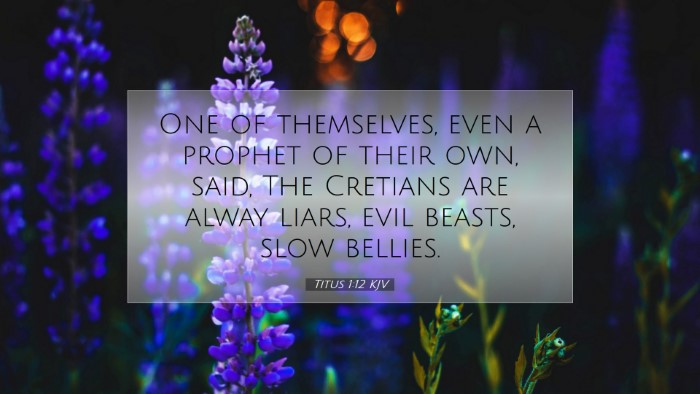Old Testament
Genesis Exodus Leviticus Numbers Deuteronomy Joshua Judges Ruth 1 Samuel 2 Samuel 1 Kings 2 Kings 1 Chronicles 2 Chronicles Ezra Nehemiah Esther Job Psalms Proverbs Ecclesiastes Song of Solomon Isaiah Jeremiah Lamentations Ezekiel Daniel Hosea Joel Amos Obadiah Jonah Micah Nahum Habakkuk Zephaniah Haggai Zechariah MalachiTitus 1:12
Titus 1:12 KJV
One of themselves, even a prophet of their own, said, The Cretians are alway liars, evil beasts, slow bellies.
Titus 1:12 Bible Commentary
Titus 1:12 Commentary
Bible Verse: "One of themselves, even a prophet of their own, said, The Cretians are alway liars, evil beasts, slow bellies."
Introduction
The verse in question, Titus 1:12, stands as a critical insight into the character of the people of Crete, highlighting their moral deficiencies as seen through the eyes of their own prophet. The implications for church leadership and the need for sound doctrine in addressing these issues are profound. This commentary draws from several public domain sources to elucidate the deeper meanings and applications of this verse.
Contextual Background
Paul writes this letter to Titus, whom he had left in Crete to establish order in the churches there. The challenges faced by the church in this region were numerous, not the least of which were the cultural attitudes of the Cretans themselves. The reputation of the Cretians, as noted here, serves as a backdrop to Paul’s admonitions regarding church governance and moral integrity.
Analysis of Key Terms
- “One of themselves”: Suggests that Paul acknowledges the local culture and its representatives, implying a need for self-critique within the community.
- “A prophet of their own”: Indicates that this commentary comes not from Paul but from a local authority, which gives weight to the observation of the Cretian character issues.
- “Liars”: This strong accusation speaks to a prevailing dishonesty among the Cretans, which would pose a significant challenge for teaching and leadership in the church.
- “Evil beasts”: Reflects a metaphor of moral degradation. The comparison suggests a brutishness or lack of humanity that Paul finds distressing.
- “Slow bellies”: This term likely points to gluttony and laziness, tying spiritual apathy to physical indulgence, which was a significant moral failing.
Insights from Commentaries
Matthew Henry
Matthew Henry interprets this passage as a commentary not only on the Cretian people but as a warning for Christians to remain vigilant against the cultural norms that may corrupt the church. He emphasizes the importance of recognizing such flaws in order to properly address them within the community, underscoring the need for leaders who can combat such tendencies.
Albert Barnes
Albert Barnes elaborates on the idea that the prophet’s words reflect a posture of invective against Cretan culture. He notes that while a generalization may not apply to all individuals, it underscores a serious collective moral reality that must be acknowledged. Barnes supports the notion that the church in Crete must maintain a standard distinct from the surrounding culture, advocating for a principled leadership approach.
Adam Clarke
Adam Clarke adds that Paul’s inclusion of a local prophet’s words serves to illustrate an awareness of one’s environment and its moral challenges. Clarke points out that understanding the vices of a society is crucial for effective ministry. He highlights the necessity of integrating sound doctrine with practical applications that challenge cultural norms, advocating for a transformative approach to preaching and teaching.
Theological Implications
The implications of Titus 1:12 extend beyond the cultural critique. The need for integrity and transparency among leaders becomes paramount in light of these societal challenges. The advice Paul offers to Titus can be viewed as timeless and applicable to contemporary church leadership.
- Cultural Awareness: Leaders must understand the cultural landscape to effectively teach and guide their congregations.
- Moral Integrity: The necessity of personal integrity in leadership cannot be overstated; leaders must model the behavior they wish to cultivate within their communities.
- Doctrinal Soundness: Emphasizing sound doctrine is essential in navigating cultural pitfalls, as it serves as a guide for ethical living and sound judgment.
Conclusion
Titus 1:12 serves as a stark reminder of the challenges presented by cultural characteristics and the responsibility of church leaders to address them head-on. By heeding insights from Matthew Henry, Albert Barnes, and Adam Clarke, pastors, theologians, and students can find meaningful instruction in addressing similar issues today. The call to embody integrity and sound doctrine remains ever relevant, calling the church to a higher standard amidst prevalent moral pitfalls.


